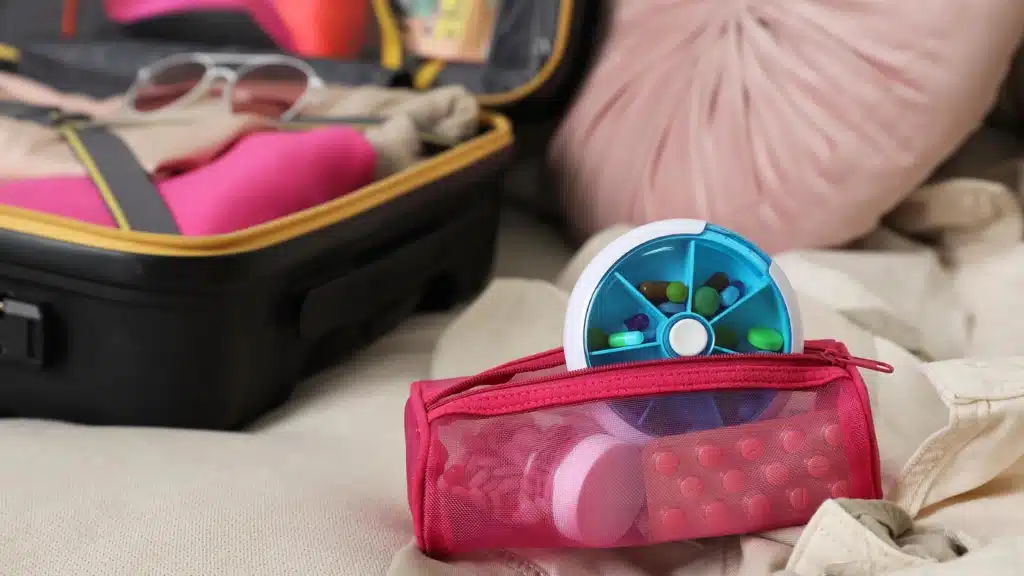 go back
go back
 go back
go back
a little planning, a lot of relief
Traveling can be an exhilarating experience filled with newly minted memories and once-in-a-lifetime adventures.
But those with allergies and/or asthma have a few extra plans to make and things to consider before leaving town. If you’re in this group, you’re not alone. In fact, allergies are the sixth leading cause of chronic illness in the country, according to Asthma and Allergy Foundation of America.
While planning for your next excursion, incorporate these tips for managing allergies and/or asthma while on vacation into your pre-trip itinerary.
How do you travel with asthma?
Planning ahead can make traveling with asthma and allergies a little easier. Knowing what things trigger your allergic reactions can help in the planning process.
Before your trip, think about where you’re headed, what your accommodations will be, and how you’ll get there. This seems like common sense for traveling, but there are certain aspects people with allergies and/or asthma have to think about in advance.
Consider your destination
Before you get too carried away with planning, think about where you’re going and what potential allergens you might face.
- Look for an allergen-free location. If you live with allergies, mountains and beaches are excellent year-round choices. Generally, beaches have lower pollen levels, and dust mites are less common at higher elevations.
- Check the weather. Not only will you know what to pack, but you’ll have a good idea of what the pollen count will look like during your trip. Sites like Pollen.com and AccuWeather provide pollen forecasts that can help you plan.
- Know your medical care options. Do research or ask the hotel concierge about medical care access. For example, if you’re going on a cruise or into a remote area, having an idea of what services are available can give you peace of mind. Check your health insurance policy to ensure your plan will cover medical visits or emergency care in other states and countries.
Provider Tip: When you travel matters.
Consider the seasonal allergens local to your destination. Also, generally, air quality is better early in the morning and later at night. Traffic will be lighter, too.
Scope out your accommodations
Where you’re staying can matter just as much as where you’re going.
- Nab a nonsmoking room. Sleeping in a room that’s housed smokers could be uncomfortable or trigger asthma symptoms. Third-hand smoke, residue from tobacco smoke, can stick to surfaces and dust for months.
- Ask about the pet policy. Those who live with a pet allergy might experience sneezing and a runny nose if the room hasn’t been cleaned well.
- Bring your own supplies. Don’t hesitate to bring your own allergen avoidance gear, such as a portable air purifier and allergen-proof pillow and mattress covers.

Adapt depending on your mode of transportation
We can’t always control our environment—something that’s often critical for those living with asthma and/or allergies. Whether you’re flying, taking public transportation, or opting for a rental car, here are some ways to navigate your mode of transportation:
- Ask for a smoke-free rental car.
- Keep a face mask on hand for crowded areas such as trains and planes.
- If flying, use a saline nasal spray frequently to keep nasal membranes moist.
Pack wisely
Don’t get too far away from home without the things you need to combat allergy and asthma symptoms. Add the following items to your packing list:
- Medications
- Insurance card
- List of medical conditions
- Face masks
- Sanitizing wipes
- Allergen-proof pillow or mattress casings
- Asthma equipment including spacer tubes, nebulizers and peak flow meters
- Self-injectable epinephrine (if you have food allergies or insect bite allergies)

Anticipate medication needs
Here are some other things you can do to prepare for your medication needs while on vacation:
- Be sure refills of your prescriptions are up to date.
- If you plan to travel for longer than a month, consider that you may need to obtain extra medication in advance. Alternatively, consider arranging for a friend of family member to pick up a monthly refill and send it to you, if a mail delivery/pick-up situation can be pre-arranged.
- Get any over-the-counter medication you might need.
- Consider wearing a medical identification bracelet if you have severe allergies.
- Make a list outlining your medical conditions, medications, dosages and medical providers. Store this on your smartphone or on a piece of paper in your wallet.
- Stay current on immunizations (e.g., flu shot).

Medically Reviewed By: Bernard Zeffren, MD
Reviewed on: Feb. 15, 2023
Our team of writers, editors, and medical experts goes over each article carefully to make sure the information is correct and that only reliable sources are used.
We regularly check to see if the info in this article matches up with the latest scientific research and expert advice so that we can give you the most up-to-date information. See list of trusted resources here.
Make An Appointment Before Your Next Vacation
Depending on the severity of your allergies and asthma, you may want to book an appointment with your medical provider. They’ll walk you through travel-related risks, and they may want to temporarily update your allergy- or asthma action plan.
Make an Appointment